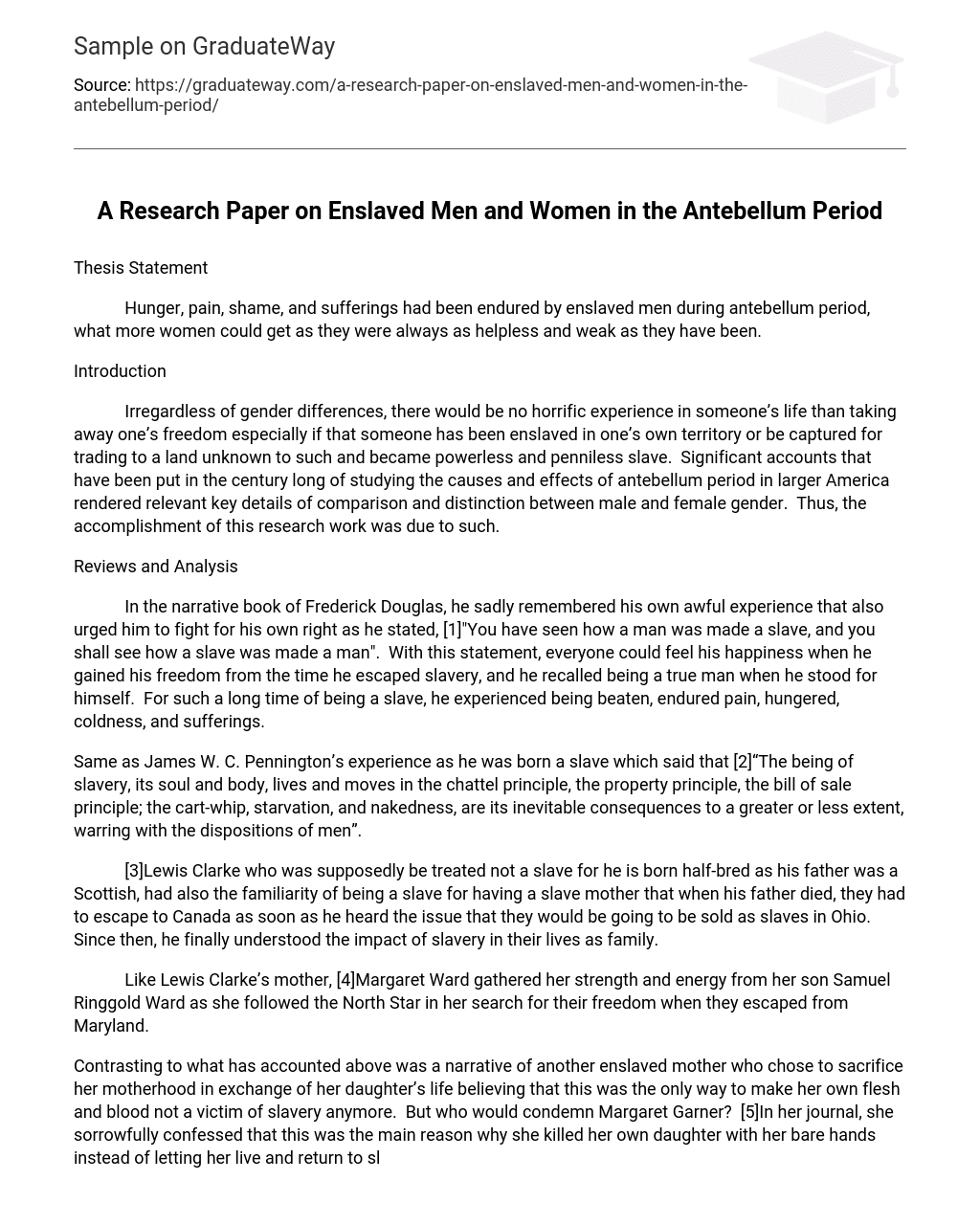Thesis Statement
Hunger, pain, shame, and sufferings had been endured by enslaved men during antebellum period, what more women could get as they were always as helpless and weak as they have been.
Introduction
Irregardless of gender differences, there would be no horrific experience in someone’s life than taking away one’s freedom especially if that someone has been enslaved in one’s own territory or be captured for trading to a land unknown to such and became powerless and penniless slave. Significant accounts that have been put in the century long of studying the causes and effects of antebellum period in larger America rendered relevant key details of comparison and distinction between male and female gender. Thus, the accomplishment of this research work was due to such.
Reviews and Analysis
In the narrative book of Frederick Douglas, he sadly remembered his own awful experience that also urged him to fight for his own right as he stated, [1]”You have seen how a man was made a slave, and you shall see how a slave was made a man”. With this statement, everyone could feel his happiness when he gained his freedom from the time he escaped slavery, and he recalled being a true man when he stood for himself. For such a long time of being a slave, he experienced being beaten, endured pain, hungered, coldness, and sufferings.
Same as James W. C. Pennington’s experience as he was born a slave which said that [2]“The being of slavery, its soul and body, lives and moves in the chattel principle, the property principle, the bill of sale principle; the cart-whip, starvation, and nakedness, are its inevitable consequences to a greater or less extent, warring with the dispositions of men”.
[3]Lewis Clarke who was supposedly be treated not a slave for he is born half-bred as his father was a Scottish, had also the familiarity of being a slave for having a slave mother that when his father died, they had to escape to Canada as soon as he heard the issue that they would be going to be sold as slaves in Ohio. Since then, he finally understood the impact of slavery in their lives as family.
Like Lewis Clarke’s mother, [4]Margaret Ward gathered her strength and energy from her son Samuel Ringgold Ward as she followed the North Star in her search for their freedom when they escaped from Maryland.
Contrasting to what has accounted above was a narrative of another enslaved mother who chose to sacrifice her motherhood in exchange of her daughter’s life believing that this was the only way to make her own flesh and blood not a victim of slavery anymore. But who would condemn Margaret Garner? [5]In her journal, she sorrowfully confessed that this was the main reason why she killed her own daughter with her bare hands instead of letting her live and return to slavery when they tried to runaway and be a captive once more. Hence, her act was merely sacrificial rather than insanity where others viewed as it is.
Last in this research was Harriet Jacobs who stated when she gave birth to a baby girl that [6]her heart was heavier than it had ever been before because she knew that slavery, in general, is terrible for men, and that it is far more terrible for women.
Compare and Contrast
Being trapped in the slavery was perhaps the only similarity of enslaved women and enslaved men in the Antebellum Period because both of them suffered, beaten, shamed, hungered, and experienced pain and tremendous discrimination from the society. However, there are some instances where enslaved women are more disadvantageous than men because contradictory to men, women are always treated as an inferior ones.
Sexual abuses, harassments and tortures were often experienced in this peculiar dilemma. Despite the consequences of having a dark skin, enslaved women were tend to attract its prey, which are their white masters. Moreover, because of being a second-rate gender than men, they became more ignorant, weak and disadvantaged, especially when these enslaved women became pregnant and unfortunate mothers.
Conclusion
As we found out through previous studies how men and women differ from each other, it also gave connotation that it made much more horror scenario when worse of the worse events set in, such as the widely spread massive slavery of the blacks. Thus, we made a conclusion that enslaved women suffered physically, mentally and even emotionally more than the enslaved men during the destructible antebellum era.
B I B L I O G R A P H Y
Clarke, Lewis. 1846. Discusses the Impact of Slavery on Family Life.
Douglas, Frederick. 1845. Narrative of the Live of American Douglas: An American
Slave.
Gilpin, Charles. 1849. The Fugitive Blacksmith. London.
Jacobs, Harriet. 1988. Incidents in the Life of a Slave Girl. Oxford: Oxford University
Press.
McWhirter, ameron. 1998. A Remnant of Slavery’s Horror. The Cincinnati Enquirer.
Ward, Margaret. 1879. Follows the North Star to Freedom.
2008. Documenting the American South. UNC University Library.
http://docsouth.unc.edu/neh/neh.html (accessed November 20, 2008).
[1] Douglas, Frederick. 1845. Narrative of the Live of American Douglas: An American Slave.
[2] Gilpin, Charles. 1849. The Fugitive Blacksmith. London.
[3] Clarke, Lewis. 1846. Discusses the Impact of Slavery on Family Life.
[4] Ward, Margaret. 1879. Follows the North Star to Freedom.
[5] McWhirter, Cameron. 1998. The Remnant of Slavery’s Horror. The Cincinnati Enquirer.
[6] Jacobs, Harriet. 1988. Incidents in the Life of a Slave Girl. Oxford: Oxford University Press.





